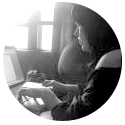Salisbury Writers' Festival 2017
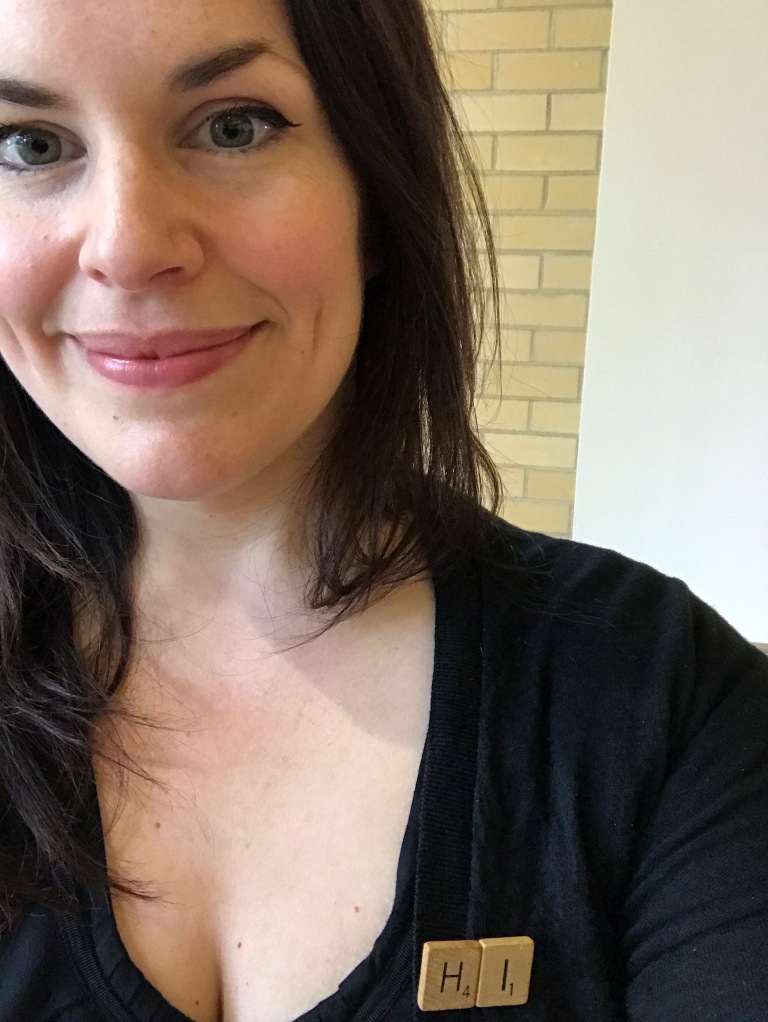 “A book is finished when you hate it, and can’t be bothered doing any more.”
“A book is finished when you hate it, and can’t be bothered doing any more.”
- Royce Kurmelovs
Yes, 2017 is accelerating into spring, and that means it’s time for the Salisbury Writers’ Festival!
Why do I love this festival so much? Three main reasons:
1. Unlike most book festivals, it’s geared towards writers, rather than readers.
2. It’s a great opportunity to hear from (and meet) new authors, publishers and agents.
3. It’s small, well-run and friendly.
In addition to stalking...er, I mean saying hello to people I only know on social media, I also get to catch up with my once-a-year festival peeps. Plus there are usually scones with jam and cream for afternoon tea. Come on, I’m only human.
 We opened Saturday’s Writers’ Forum with an address from Tricia Stringer, author of eight books. Tricia has a teaching background, and she was a delight to listen to. (Plus she warned us in advance that she ‘likes to wave her arms around a lot’—a woman after my own heart.)
We opened Saturday’s Writers’ Forum with an address from Tricia Stringer, author of eight books. Tricia has a teaching background, and she was a delight to listen to. (Plus she warned us in advance that she ‘likes to wave her arms around a lot’—a woman after my own heart.)
Tricia got into writing by creating history stories for her students. She self-published her first book, and was eventually picked up by Harlequin. Interestingly, her first book has been updated—“mobile technology has come a long way since it was first written”—and re-released by Harlequin under a different name, A Chance of Stormy Weather.
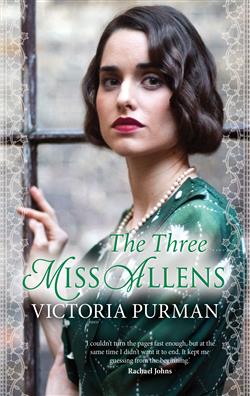 Next up, we had Publication Pathways with journalist and writer Royce Kurmelovs, author and editor Jennifer Mills, and author Victoria Purman. (Cover of Victoria's latest book right, just because it's so darned pretty.) Victoria and Royce both credit their journalism backgrounds with honing the tenacity and discipline that's demanded of writing a book. Jennifer, incredibly, put everything on the line to forge a career in writing, and that's not an exaggeration: she lived in her Holden for 2 years. (Interestingly, Royce’s first book is called The Death of Holden. IS IT A SIGN?)
Next up, we had Publication Pathways with journalist and writer Royce Kurmelovs, author and editor Jennifer Mills, and author Victoria Purman. (Cover of Victoria's latest book right, just because it's so darned pretty.) Victoria and Royce both credit their journalism backgrounds with honing the tenacity and discipline that's demanded of writing a book. Jennifer, incredibly, put everything on the line to forge a career in writing, and that's not an exaggeration: she lived in her Holden for 2 years. (Interestingly, Royce’s first book is called The Death of Holden. IS IT A SIGN?) 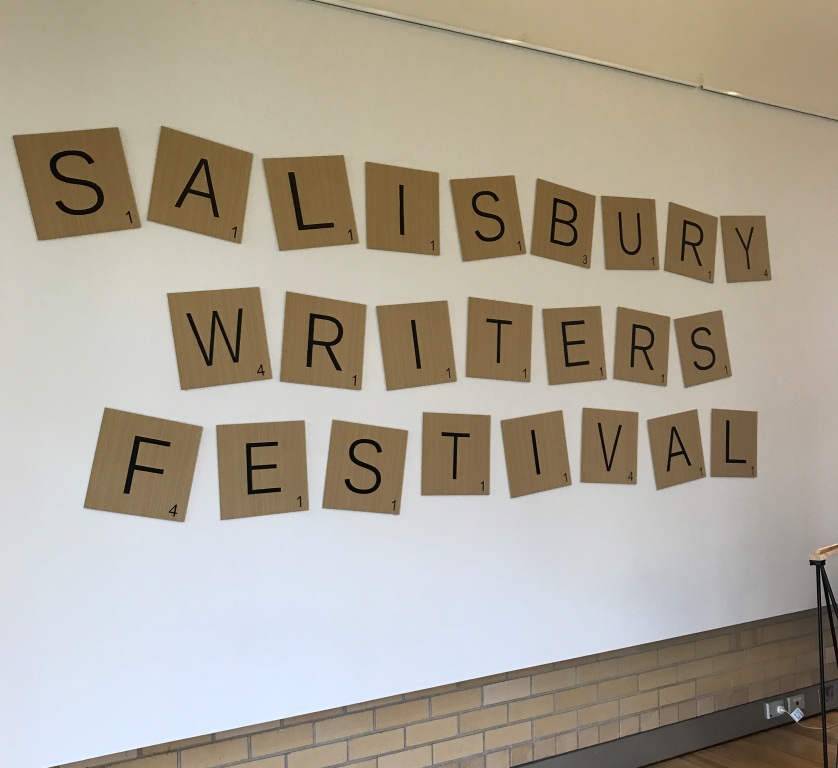 Jennifer also made an excellent point for those writers not yet published: for many people, getting a book contract feels like “the wedding at the end of the rom-com. It’s not.” It's very true; a lot of authors are taken aback by how much work comes after you sign with a publisher. Regardless of background and publication journey, the number-one piece of advice that all three panellists had was simple: don’t be a dick. Stellar life advice. (And echoed in my day job, too.)
Jennifer also made an excellent point for those writers not yet published: for many people, getting a book contract feels like “the wedding at the end of the rom-com. It’s not.” It's very true; a lot of authors are taken aback by how much work comes after you sign with a publisher. Regardless of background and publication journey, the number-one piece of advice that all three panellists had was simple: don’t be a dick. Stellar life advice. (And echoed in my day job, too.)
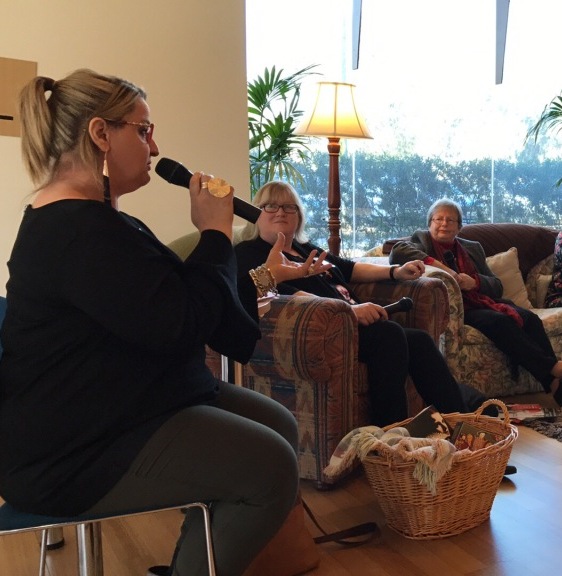 The next panel, Behind Closed Doors, was a fascinating look at what happens after your book is published. We had Marie Isaacson from Hachette Australia, local author Liz Harfull, and booksellers Margie Arnold from Meg’s Bookshop and Becky Lucas from Shakespeare’s at Blackwood. Liz spends a phenomenal amount of time on the marketing and research behind her books (six so far), and stressed the importance of knowing your reader base. She was even given an allowance from Allen and Unwin to commission and shoot the cover for Women Of The Land, which shows how much confidence her publisher has in her areas of expertise.
The next panel, Behind Closed Doors, was a fascinating look at what happens after your book is published. We had Marie Isaacson from Hachette Australia, local author Liz Harfull, and booksellers Margie Arnold from Meg’s Bookshop and Becky Lucas from Shakespeare’s at Blackwood. Liz spends a phenomenal amount of time on the marketing and research behind her books (six so far), and stressed the importance of knowing your reader base. She was even given an allowance from Allen and Unwin to commission and shoot the cover for Women Of The Land, which shows how much confidence her publisher has in her areas of expertise. 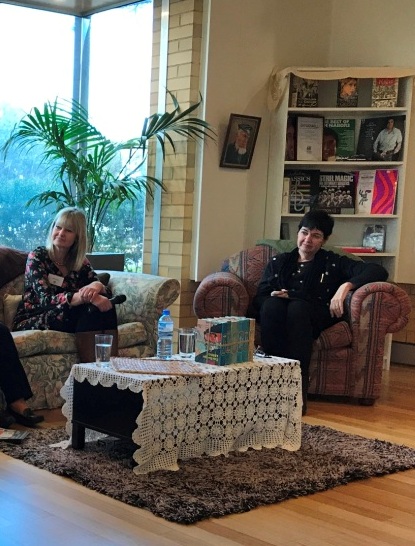 Marie detailed the ways publishers such as Hachette notify bookshops about new titles. Lists. So many lists! They tend to act as a matchmaker between books and booksellers, but in the end it's the bookshop, not the publisher, who decides what ends up on the shelves. Yes, your local bookshop really does hand-pick all their titles. They choose stock with their customer base in mind, which is why the selection differs from shop to shop. Marie also beautifully emphasised the importance of publishers and booksellers supporting Australian authors. (“We should be printing and publishing our own stories, written by people here.”) #highfive
Marie detailed the ways publishers such as Hachette notify bookshops about new titles. Lists. So many lists! They tend to act as a matchmaker between books and booksellers, but in the end it's the bookshop, not the publisher, who decides what ends up on the shelves. Yes, your local bookshop really does hand-pick all their titles. They choose stock with their customer base in mind, which is why the selection differs from shop to shop. Marie also beautifully emphasised the importance of publishers and booksellers supporting Australian authors. (“We should be printing and publishing our own stories, written by people here.”) #highfive 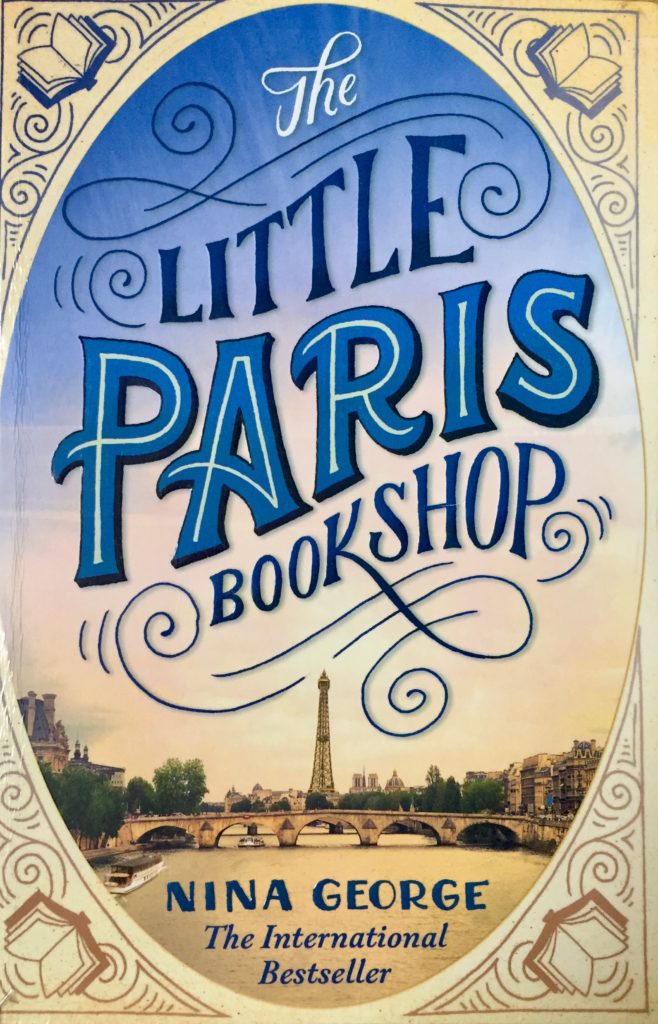 Becky and Margie both agreed that booksellers value local authors (hurray!), and noted that it’s the bookseller’s job to look after the author’s "babies". Also, you know the saying about how you can’t judge a book by its cover? Well, a nice cover really does help sales. The Little Paris Bookshop was quoted by both booksellers as being an excellent example of a cover which draws people straight in. (I feel the same way about Those Pleasant Girls...) Book-buyers: the bowerbirds of the written word.
Becky and Margie both agreed that booksellers value local authors (hurray!), and noted that it’s the bookseller’s job to look after the author’s "babies". Also, you know the saying about how you can’t judge a book by its cover? Well, a nice cover really does help sales. The Little Paris Bookshop was quoted by both booksellers as being an excellent example of a cover which draws people straight in. (I feel the same way about Those Pleasant Girls...) Book-buyers: the bowerbirds of the written word.
Two other key points were mentioned in this panel:
1) Authors, please don’t rearrange the shelves.
2) Readers, don't pick up a cheap book at Big W and then take it to a bookshop’s author event to get it signed. (Who DOES THIS?)
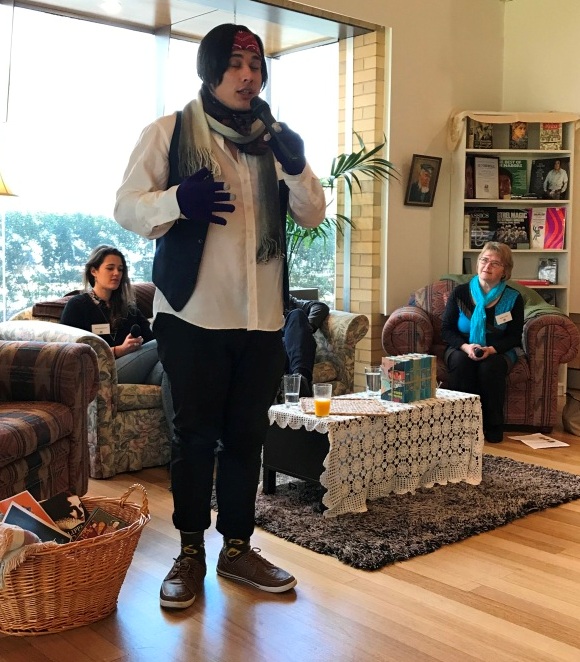 I was especially looking forward to the next panel on Reading Your Work. Although I don’t have too much trouble talking to an audience, I would rather set myself on fire than read out my own writing, so I was desperate for tips. Writer, critic, and bookseller Ben Brooker, emerging writer and podcast creator Lauren Butterworth, and spoken word artist Matcho Intrumz (who also gave two impromptu performances) all agreed that reading your work to an audience is a great way to get immediate, tactile feedback on whether something’s working or not. (As someone who spent many years in amateur theatre performances, I can attest to how correct this is.)
I was especially looking forward to the next panel on Reading Your Work. Although I don’t have too much trouble talking to an audience, I would rather set myself on fire than read out my own writing, so I was desperate for tips. Writer, critic, and bookseller Ben Brooker, emerging writer and podcast creator Lauren Butterworth, and spoken word artist Matcho Intrumz (who also gave two impromptu performances) all agreed that reading your work to an audience is a great way to get immediate, tactile feedback on whether something’s working or not. (As someone who spent many years in amateur theatre performances, I can attest to how correct this is.)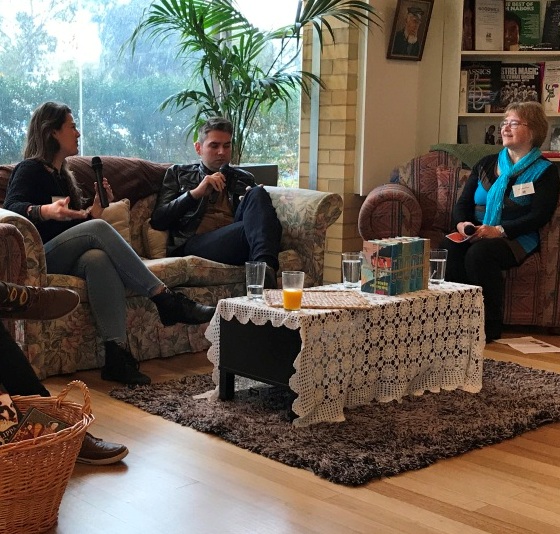 The other big take-away was how important it is to practice. Matcho recommends recording yourself so you can hear exactly where you need to slow down, speed up, or change your pitch. Lauren also gave this incredibly useful piece of advice: “When you are performing in front of a crowd, you are the expert in your own work.” This tip works for every kind of public speaking, too, so it’s a great thing to keep in mind. (Thank you, Lauren!)
The other big take-away was how important it is to practice. Matcho recommends recording yourself so you can hear exactly where you need to slow down, speed up, or change your pitch. Lauren also gave this incredibly useful piece of advice: “When you are performing in front of a crowd, you are the expert in your own work.” This tip works for every kind of public speaking, too, so it’s a great thing to keep in mind. (Thank you, Lauren!)
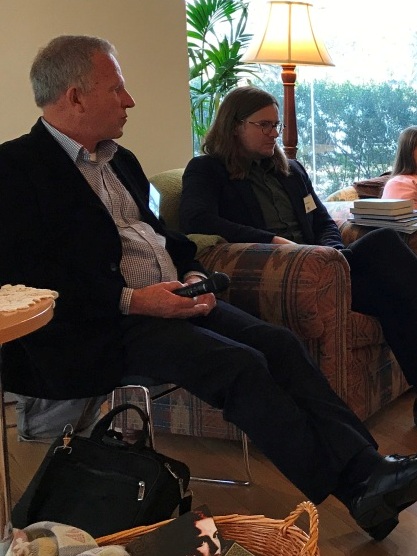 Next up, the Panel of Publishers -- always a big festival draw. This year's panel featured The Author’s Agent Brian Cook, Sam Cooney from The Lifted Brow, Lynette Washington from Midnight Sun Publishing, and Martin Hughes from Affirm Press. (While I was live-tweeting the day, an industry contact said this was the best group to go out drinking with. Ha!)
Next up, the Panel of Publishers -- always a big festival draw. This year's panel featured The Author’s Agent Brian Cook, Sam Cooney from The Lifted Brow, Lynette Washington from Midnight Sun Publishing, and Martin Hughes from Affirm Press. (While I was live-tweeting the day, an industry contact said this was the best group to go out drinking with. Ha!)
This panel gave a fascinating look at the differences between large and small publishing houses. Although it's arts-driven, publishing is still a business, so a larger publisher will need a greater return on investment; they don’t have the leeway to take a punt on passion projects, where as a small publisher such as Midnight Sun can take risks on niche books with smaller audiences. 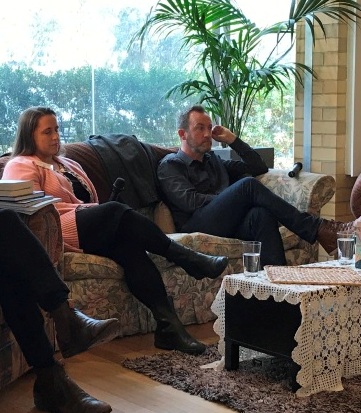 Like Midnight Sun, The Lifted Brow’s publishing arm emerged out of a desire to publish writers who would not otherwise make it into print. A smaller publishing house also means that there’s a greater chance for a close author/publisher relationship, which sometimes larger publishers can’t offer.
Like Midnight Sun, The Lifted Brow’s publishing arm emerged out of a desire to publish writers who would not otherwise make it into print. A smaller publishing house also means that there’s a greater chance for a close author/publisher relationship, which sometimes larger publishers can’t offer.
When looking for a manuscript to take on, all publishers are looking for two things: a great idea that’s been well-executed. If you’ve got that, and you also read the submissions guidelines (yes, it's in bold for a reason), you’ve got a good shot of getting out of the slush pile. (Martin Hughes also loves submissions which spell his or the company’s name wrong; "it means one less manuscript to read”. You have been warned.)
 The publishers’ panel stayed on for the last session of the day: the infamous First Page. As the name suggests, this is where writers anonymously submit their manuscript’s first page, and then wait all day to see if it will be shredded, praised, or completely ignored. (This is also the panel which brought the amazing Vikki Wakefield to the attention of a publisher, like a Cinderella in Doc Martens, so it’s highly anticipated.)
The publishers’ panel stayed on for the last session of the day: the infamous First Page. As the name suggests, this is where writers anonymously submit their manuscript’s first page, and then wait all day to see if it will be shredded, praised, or completely ignored. (This is also the panel which brought the amazing Vikki Wakefield to the attention of a publisher, like a Cinderella in Doc Martens, so it’s highly anticipated.)
Martin, straight out of the gate, says he doesn’t find the first page particularly important; he looks for an overall sense of confidence and control rather than rejecting a manuscript outright if the initial paragraphs are flawed. (So you can potentially ignore any expert who tells you your manuscript is otherwise doooooooooomed. There's a lot of doom-mongering in writing advice circles. Wait, is 'doom-mongering' a word? Sure it is.) 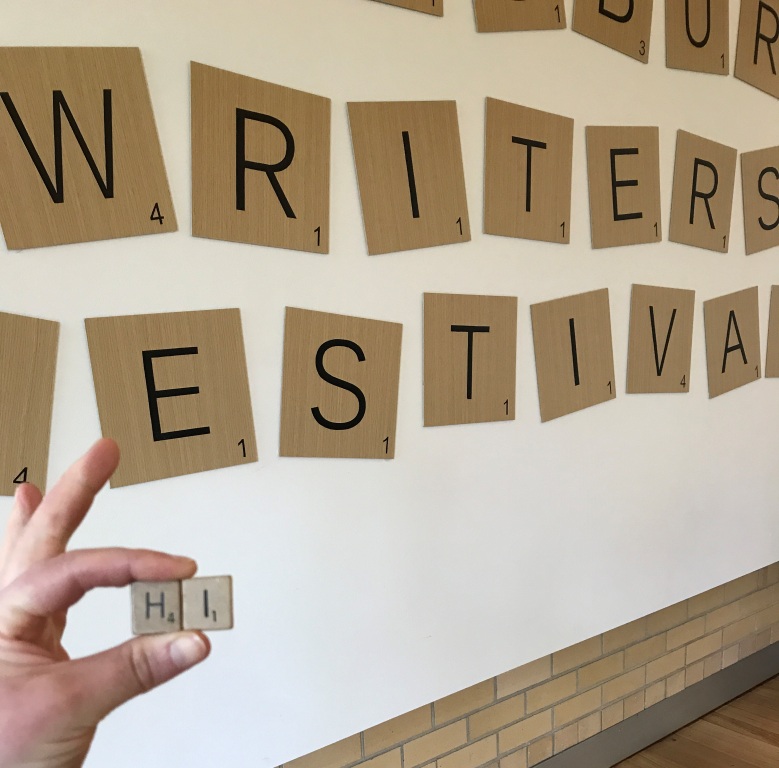 Samuel also noted that the first page can be a warm-up of sorts for the writer, and is sometimes removed altogether, as many writers “write their way into a story”. (This was also echoed the other week by Allison Tait on the Writers’ Centre podcast. If you're not listening to this podcast, you should be.)
Samuel also noted that the first page can be a warm-up of sorts for the writer, and is sometimes removed altogether, as many writers “write their way into a story”. (This was also echoed the other week by Allison Tait on the Writers’ Centre podcast. If you're not listening to this podcast, you should be.)
For aspiring children's authors, never submit your books with illustrations or formatting! This is the publisher’s job to take care of; your job is purely to concentrate on the story. With all manuscripts, a publisher can fix punctuation or structural problems, but if the manuscript doesn’t actually have a story, there’s nothing they can do with it.
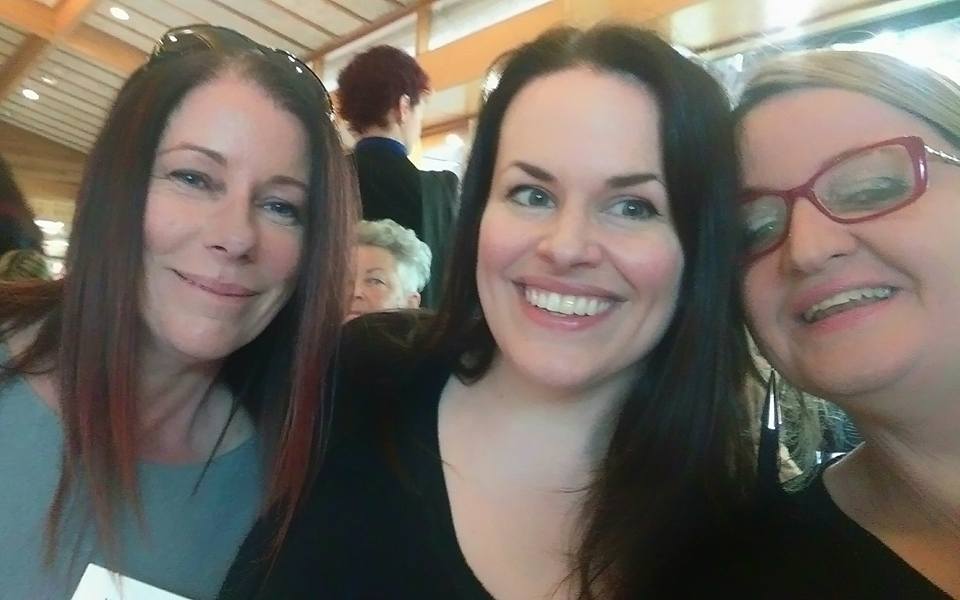 And that’s it for 2017! Thanks to the City of Salisbury for hosting this brilliant event, to the wonderful MC of the day Allayne Webster (seen here to my right, with bonus Vikki Wakefield), to Dymocks Adelaide for their bookstand, and to the crazy hard work of the Festival panel for getting everything together.
And that’s it for 2017! Thanks to the City of Salisbury for hosting this brilliant event, to the wonderful MC of the day Allayne Webster (seen here to my right, with bonus Vikki Wakefield), to Dymocks Adelaide for their bookstand, and to the crazy hard work of the Festival panel for getting everything together.
Also, a huge shout-out also to my festival friend Suzan M., who’s just got her first book contract with Midnight Sun! *insert woop-woop emoji here*
See you next year!

